Happy Birthday, Bob Bailey!
Robert Bainter Bailey was born in Toledo, OH on this date in 1913. Though some would argue he never fulfilled his ambition to become a motion picture star, old-time radio fans will trump that card by insisting that Bob Bailey was king in the medium of radio, thanks to his exceptional speaking voice. Radio veteran Harry Bartell once observed: “Bob was a stylish, very professional actor whose voice fit perfectly into the two characters by which he is best known.” One of those characters was a jack-of-all-trades who eventually morphed into a first-rate private eye named George Valentine (on Let George Do It). The other was also in the investigation business; Bailey breathed new life into “America’s fabulous freelance investigator,” who was previously known for generously tipping with silver dollars. Bob Bailey would be responsible for making Yours Truly, Johnny Dollar the gold standard of radio crime dramas.
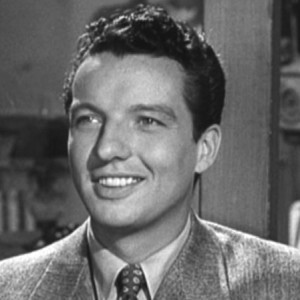 It sounds like the song Judy Garland sang in the 1954 musical A Star is Born, but Bob Bailey really was “born in a trunk.” Both of his parents were stage actors, and Bailey followed in their footsteps by appearing in front of the footlights at the age of eighteen months. His first gig in front of a radio mike was in 1925, when he and his father landed parts in a play presented on local radio. From there, Bob migrated to Chicago, and earned his bread-and-butter emoting on the likes of soap operas and other series, among them Aunt Mary, Girl Alone, Kitty Keene, Incorporated, Knickerbocker Playhouse, Mortimer Gooch, One Man’s Family, Road of Life, Scattergood Baines, The Story of Holly Sloan, That Brewster Boy, and Today’s Children.
It sounds like the song Judy Garland sang in the 1954 musical A Star is Born, but Bob Bailey really was “born in a trunk.” Both of his parents were stage actors, and Bailey followed in their footsteps by appearing in front of the footlights at the age of eighteen months. His first gig in front of a radio mike was in 1925, when he and his father landed parts in a play presented on local radio. From there, Bob migrated to Chicago, and earned his bread-and-butter emoting on the likes of soap operas and other series, among them Aunt Mary, Girl Alone, Kitty Keene, Incorporated, Knickerbocker Playhouse, Mortimer Gooch, One Man’s Family, Road of Life, Scattergood Baines, The Story of Holly Sloan, That Brewster Boy, and Today’s Children.
By the 1940s, Bailey had latched onto his big break: he was signed to a picture contract at 20th Century-Fox. Bob had roles in such Fox productions as The Eve of St. Mark (1944), Wing and a Prayer (1944) and Sunday Dinner for a Soldier (1944), while Laurel and Hardy fans saw Bailey featured in two films starring The Boys, Jitterbugs (1943) and The Dancing Masters (1943). While pursuing his thespic ambitions on the big screen, the actor continued performing with a windscreen; Bailey graced such radio shows as Arch Oboler’s Plays, The Cavalcade of America, The Lux Radio Theatre, Mayor of the Town, and Suspense.
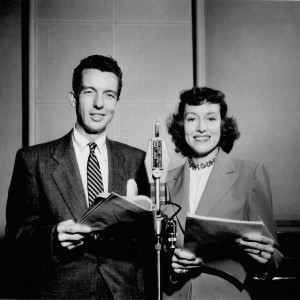 Bailey gradually discovered he had a knack for radio performing, and in 1946 he landed the first of the two jobs that would guarantee him radio immortality. On Mutual’s Let George Do It, Bob played George Valentine—an ex-GI who returned stateside to start a business in which he would undertake the unpleasant tasks others could or would not. (Hence, the series’ title: “Let George do it.”) As the show progressed, George Valentine became less of a concierge and more of a detective—aided and abetted by his gal Friday Claire “Brooksie” Brooks (played by Frances Robinson and Virginia Gregg), who also functioned as his romantic companion (though George was able to thwart Brooksie’s constant suggestions that the two of them take a walk down a certain aisle). Other actors that appeared on Let George Do It included Eddie Firestone (as Sonny, Brooksie’s brother), Joseph Kearns (as sardonic elevator man Caleb), Wally Maher (as Lieutenant Riley, Valentine’s “frenemy” on the police force) and Ken Christy (as Lieutenant Johnson—who took over after actor Maher’s untimely passing in 1951).
Bailey gradually discovered he had a knack for radio performing, and in 1946 he landed the first of the two jobs that would guarantee him radio immortality. On Mutual’s Let George Do It, Bob played George Valentine—an ex-GI who returned stateside to start a business in which he would undertake the unpleasant tasks others could or would not. (Hence, the series’ title: “Let George do it.”) As the show progressed, George Valentine became less of a concierge and more of a detective—aided and abetted by his gal Friday Claire “Brooksie” Brooks (played by Frances Robinson and Virginia Gregg), who also functioned as his romantic companion (though George was able to thwart Brooksie’s constant suggestions that the two of them take a walk down a certain aisle). Other actors that appeared on Let George Do It included Eddie Firestone (as Sonny, Brooksie’s brother), Joseph Kearns (as sardonic elevator man Caleb), Wally Maher (as Lieutenant Riley, Valentine’s “frenemy” on the police force) and Ken Christy (as Lieutenant Johnson—who took over after actor Maher’s untimely passing in 1951).
Bob Bailey didn’t just limit his radio work to Let George Do It; in this period the actor also performed on such venues as Family Theatre, The General Electric Theatre, Honest Harold (The Hal Peary Show), The Line-Up, Romance, Screen Director’s Playhouse, and Stars Over Hollywood. Bailey’s stint as George ended in the program’s last season (it signed off the air on September 27, 1954). Bob worked on a pair of movies, No Escape (1953) and Not as a Stranger (1955), and then he signed on for the radio job for which many in the hobby remember (and love) him best.
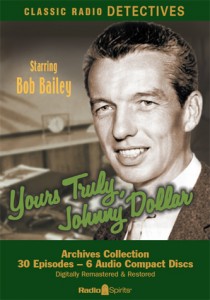 Bob Bailey got the Johnny Dollar gig at a most opportune moment. Since February of 1949, the series had been a lighthearted half-hour about an insurance investigator who worked for a number of different underwriting firms. When Bailey settled into the role, the show had switched to a five-day-a-week quarter-hour presentation—which allowed for longer stories and fuller character development. Bob took to Johnny Dollar like a duck to water (he had actually appeared on two of the earlier broadcasts, “The Lancer Jewelry Matter” and “The Classified Killer Matter”), and fans mostly agree that the serialized version of the series remains the highpoint for the long-running show. The quarter-hour format lasted only a year, but Johnny Dollar returned to its half-hour status with Bailey at the helm. Bob even penned one of the episodes, “The Carmen Kringle Matter,” using the nom de plume of “Robert Bainter.”
Bob Bailey got the Johnny Dollar gig at a most opportune moment. Since February of 1949, the series had been a lighthearted half-hour about an insurance investigator who worked for a number of different underwriting firms. When Bailey settled into the role, the show had switched to a five-day-a-week quarter-hour presentation—which allowed for longer stories and fuller character development. Bob took to Johnny Dollar like a duck to water (he had actually appeared on two of the earlier broadcasts, “The Lancer Jewelry Matter” and “The Classified Killer Matter”), and fans mostly agree that the serialized version of the series remains the highpoint for the long-running show. The quarter-hour format lasted only a year, but Johnny Dollar returned to its half-hour status with Bailey at the helm. Bob even penned one of the episodes, “The Carmen Kringle Matter,” using the nom de plume of “Robert Bainter.”
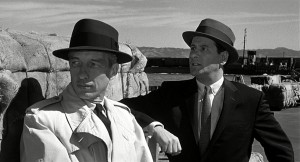 During his stint as “the man with the action-packed expense account,” Bob Bailey also tried his hand in television and movies; he guest-starred on such series as Tightrope, M Squad and The Line-Up, and even had a small role in the movie version of the latter program, released in 1958. Bailey was never able to progress beyond character roles, however; two attempts to bring Let George Do It to television in the 1950s went nowhere because producers believed Bailey didn’t have the right “build” for the small screen. Bob would encounter similar problems when the idea for a possible Yours Truly, Johnny Dollar series began to be kicked around in 1962; while the producers knew the audience wouldn’t accept anyone else in the role, they just didn’t think the actor who was synonymous with Dollar was “he-man” enough for TV (Bailey was 5’9”, and tipped the scales at 150 lbs.).
During his stint as “the man with the action-packed expense account,” Bob Bailey also tried his hand in television and movies; he guest-starred on such series as Tightrope, M Squad and The Line-Up, and even had a small role in the movie version of the latter program, released in 1958. Bailey was never able to progress beyond character roles, however; two attempts to bring Let George Do It to television in the 1950s went nowhere because producers believed Bailey didn’t have the right “build” for the small screen. Bob would encounter similar problems when the idea for a possible Yours Truly, Johnny Dollar series began to be kicked around in 1962; while the producers knew the audience wouldn’t accept anyone else in the role, they just didn’t think the actor who was synonymous with Dollar was “he-man” enough for TV (Bailey was 5’9”, and tipped the scales at 150 lbs.).
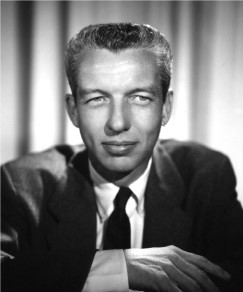 When Yours Truly, Johnny Dollar moved to New York in December of 1960, Bob Bailey elected to stay behind in Hollywood…and so the part of Johnny went to Bob Readick. Bailey found work in guest appearances on shows like The Asphalt Jungle, 87th Precinct and Tales of Wells Fargo, and purportedly penned a few episodes of the children’s adventure Fury (with Peter Graves) as “Robert B. Bailey.” Sadly, his last credit was a bit part in Birdman of Alcatraz (1962), as a reporter in a scene with star Burt Lancaster and Edmond O’Brien (who had once played Johnny Dollar on radio himself). It was not generally known at the time—many of Bailey’s radio colleagues were reluctant to discuss the details—but Bob suffered from alcoholism, and nearly a decade of his life was lost to public view before he was able to lick the problem through Alcoholics Anonymous. This provided only a brief respite from his inner demons; he suffered a stroke in 1973 and spent the next ten years in a Lancaster, CA rest home before his passing in 1983 at the age of 70.
When Yours Truly, Johnny Dollar moved to New York in December of 1960, Bob Bailey elected to stay behind in Hollywood…and so the part of Johnny went to Bob Readick. Bailey found work in guest appearances on shows like The Asphalt Jungle, 87th Precinct and Tales of Wells Fargo, and purportedly penned a few episodes of the children’s adventure Fury (with Peter Graves) as “Robert B. Bailey.” Sadly, his last credit was a bit part in Birdman of Alcatraz (1962), as a reporter in a scene with star Burt Lancaster and Edmond O’Brien (who had once played Johnny Dollar on radio himself). It was not generally known at the time—many of Bailey’s radio colleagues were reluctant to discuss the details—but Bob suffered from alcoholism, and nearly a decade of his life was lost to public view before he was able to lick the problem through Alcoholics Anonymous. This provided only a brief respite from his inner demons; he suffered a stroke in 1973 and spent the next ten years in a Lancaster, CA rest home before his passing in 1983 at the age of 70.
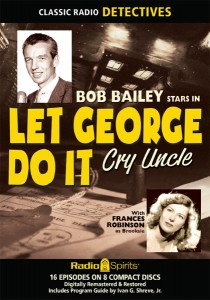 “If you know how to handle your voice in radio, it’s almost impossible to destroy an illusion,” Bob Bailey was once quoted as saying. Though his life may have ended on a tragic note, his radio legacy is filled with riches that await both the experienced and novice old-time radio fan. Radio Spirits has a great many collections of Bailey’s signature series, Yours Truly, Johnny Dollar, on hand: Confidential, Expense Account Submitted, Murder Matters, Phantom Chases, and Wayward Matters. (We also cannot recommend highly enough our “Dollar starter,” The Many Voices of Yours Truly, Johnny Dollar.) For George Valentine devotees, check out Let George Do It and our latest collection, Cry Uncle (with liner notes by yours truly!). Happy birthday, Bob Bailey!
“If you know how to handle your voice in radio, it’s almost impossible to destroy an illusion,” Bob Bailey was once quoted as saying. Though his life may have ended on a tragic note, his radio legacy is filled with riches that await both the experienced and novice old-time radio fan. Radio Spirits has a great many collections of Bailey’s signature series, Yours Truly, Johnny Dollar, on hand: Confidential, Expense Account Submitted, Murder Matters, Phantom Chases, and Wayward Matters. (We also cannot recommend highly enough our “Dollar starter,” The Many Voices of Yours Truly, Johnny Dollar.) For George Valentine devotees, check out Let George Do It and our latest collection, Cry Uncle (with liner notes by yours truly!). Happy birthday, Bob Bailey!

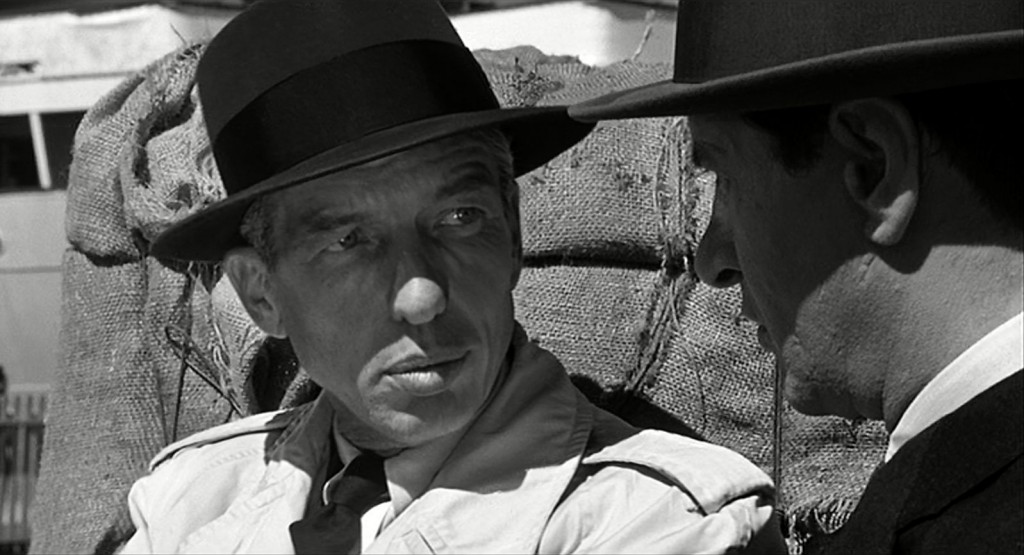

This ‘exceptional speaking voice’: Yes, I always like his hard/soft guy voice, deep and brusque, yet surprisingly playful when opposite female characters. I think there’s that underlying sexual tension I hear in Dick Powell’s shamus character.
“If you know how to handle your voice in radio, it’s almost impossible to destroy an illusion.” Is this what we’re talking about here—understanding the character, communicating it in the tone of your voice?
Definitely the best Johnny Dollar! No question at all. When the show moved to New York and he didn’t go along, that was the end of that character. His “replacement” just didn’t measure up.
Just want to say, Thank you Greg Bell for bringing this to us. Johnny Dollar is just so good to listen to.. A sad ending to a great radio personality.